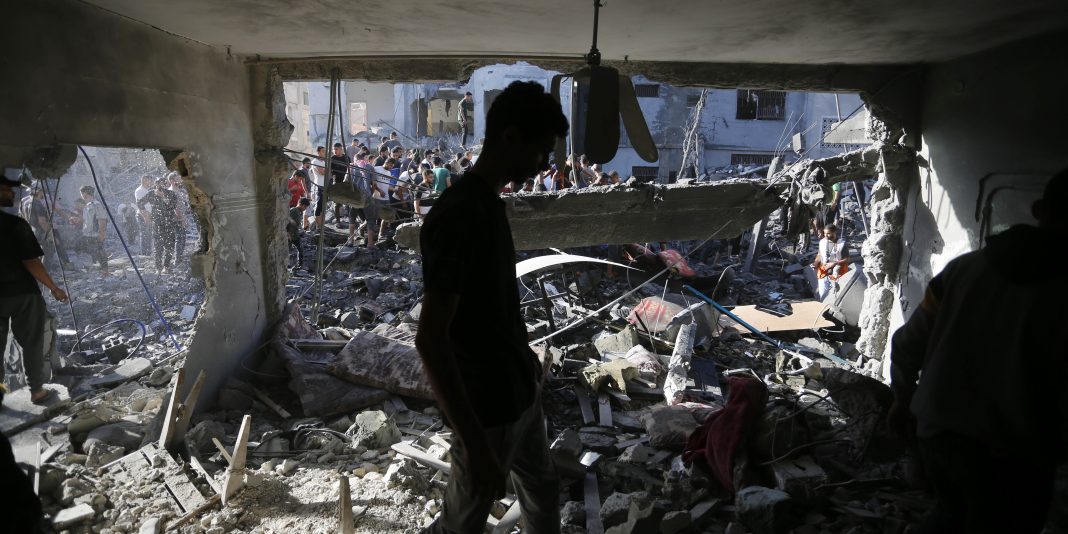A Very Stark Difference
During a United Nations Security Council meeting, U.S. Ambassador Linda Thomas-Greenfield strongly condemned Russia’s bombing of Ukraine’s largest children’s hospital. She labeled Russia’s aggression as a “campaign of terror” and denounced its attacks on civilian infrastructure as violations of international law. Other countries, including the United Kingdom and France, echoed her denunciations. However, the U.S. response to Russia’s actions stands in stark contrast to its handling of Israel’s attacks on Gaza.
The U.S. has consistently supported Israel militarily and diplomatically, despite its attacks on civilian infrastructure such as hospitals and schools in Gaza. The International Court of Justice has deemed Israel’s campaign in Gaza a plausible genocide. This stark difference in the U.S.’s response to the two conflicts has drawn criticism from experts in international law.
Jessica Peake, an international law professor at the University of California, Los Angeles School of Law, commended the U.S. for condemning Russia’s actions but pointed out the lack of strong language when it comes to Palestinian hospitals, schools, and children. This discrepancy raises questions about the U.S.’s moral clarity and consistency in addressing human rights abuses.
The U.N. Security Council’s criticism of Russia mirrored a similar moment earlier this year, but with one significant difference: the U.S. response. In April, after Israel bombed a convoy of aid workers and ended its siege of Gaza’s largest hospital, council members condemned the attacks as clear violations of international humanitarian law. The U.S. joined the calls for protecting aid workers but shifted the blame to Hamas for the hospital attack.
While there are differences between the conflicts in Ukraine and Gaza, including the long-standing U.S.-Israel alliance, there are also clear parallels in human rights abuses and violations of international law. The U.S.’s handling of these conflicts has been criticized as hypocritical. In Ukraine, the U.S. plays a central role in seeking an end to the conflict and accountability, while in Gaza, it vetoes resolutions and waters down statements to make Israel appear more reasonable.
The U.S. has vetoed three separate U.N. Security Council resolutions calling for a humanitarian pause or immediate ceasefire in Gaza. It argues that diplomatic approaches are more effective than public censures and emphasizes its role in brokering a ceasefire between Israel and Hamas. However, Israel continues to escalate its bombardment in Gaza, causing civilian casualties and destruction of infrastructure.
Israel’s recent attacks on schools and civilian areas have resulted in numerous deaths, including women and children. Despite these actions, the U.S. has yet to condemn them. In fact, the Biden administration agreed to send hundreds of 500-pound bombs to Israel. The lack of condemnation and continued military support raises concerns about the U.S.’s commitment to protecting civilian lives.
Experts argue that the U.S. could take decisive action to end the conflict in Gaza by cutting off weapon supplies or funding to Israel. This would send a clear message and potentially bring about a ceasefire. The Lancet, one of the world’s leading medical journals, estimates that the death toll in Gaza is 186,000, highlighting the urgent need for action.
In conclusion, the differing responses from the U.S. towards the conflicts in Ukraine and Gaza raise questions about its moral clarity and consistency in addressing human rights abuses. While the U.S. condemns Russia’s actions, it continues to support Israel despite its attacks on civilian infrastructure. This discrepancy undermines the U.S.’s credibility and calls for a more principled approach to protecting civilian lives in all conflicts.


